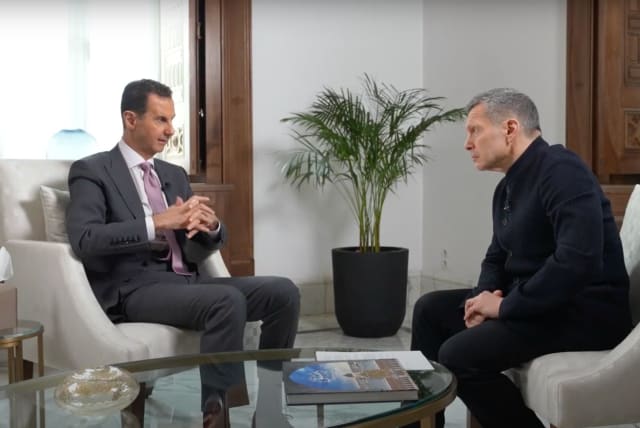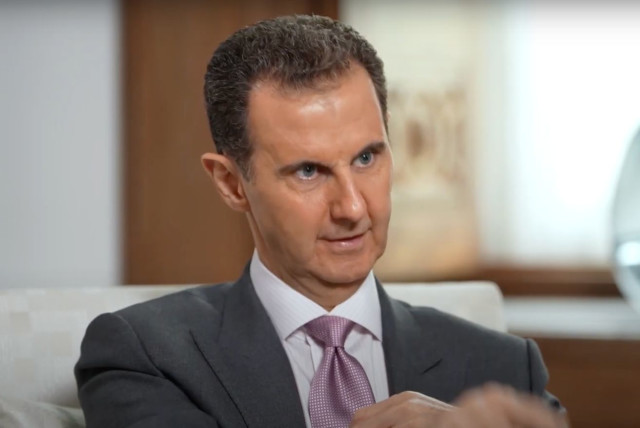In rare interview, Syria’s Assad defends Hamas, praises Putin to pro-Kremlin journalist

The Syrian dictator also expressed support for Russia’s 2022 invasion of Ukraine, and compared the war between Israel and Hamas to that war, painting both Hamas and Russia as acting in self-defense.
Syrian President Bashar al-Assad gave a rare interview this week to a Kremlin-aligned Russian news presenter from his palace in the capital city of Damascus, defending Hamas, praising Putin, and casting the United States as a hypocritical hegemon that the two dictatorships have served to humble.
Assad, whose government has been fighting rebel groups for almost thirteen years in a civil war that has taken about 500,000 lives, presented Israel as the aggressor in Gaza, and justified Hamas’s October 7 invasion of Israel’s south as self-defense, insisting that the attack is justified by historical context.
The Syrian dictator also expressed support for Russia’s 2022 invasion of Ukraine, and compared the war between Israel and Hamas to that war, asserting that Russia’s invasion of the European nation was self-defense, just as he views Hamas’s invasion of Israel to have been:
“Anyone from Israel will come and say to you, ‘but you are talking about history,’” Assad told his Russian interviewer, Vladimir Solovyov, “[but] is history separated from the past?” The Syrian president then implied that the invasion of Ukraine was a response to “attempts to encircle your country, Russia, from the south,” concluding, “Everything that happens in the present is a result of history. The situation is the same."
Interview underscores Syria-Russia-Iran alliance
Assad has been allied with Russian President Vladimir Putin since September 2015, an alliance that is widely credited with having shifted the balance of the conflict, turning the battlefield in Assad’s favor and thus rescuing the Arab nationalist regime. A relentless Russian bombing campaign allowed the regime to retake the city of Aleppo in late 2016, and Idlib from 2018 to 2020.
Both these campaigns were widely accused of war crimes, with Russian forces appearing to routinely target civilian infrastructure.
Iran also participated in the war, supporting Assad via arms, training, special forces, and the support of its proxy militias, such as Hezbollah, which has been attacking Israel’s north, and exchanging fire with the IDF along the Israel-Lebanon border, since Hamas attacked the Jewish state on October 7, initiating the ongoing war. Iran has also supported Russia’s war against Ukraine, supplying the Russian military with arms such as Shahed drones.
Solyvov, the Russian journalist who interviewed Assad, began the sit-down by praising Assad’s Syria as “great country that freely chose its fate,” while invoking Iran as a potential victim of nuclear aggression by the United States or Israel, saying that these two were the “only countries that could use nuclear weapons” and that Iran could be targeted, if the conflict in the region escalates.
Denial of war crimes by Assad or Russia in Syria and Ukraine
Assad and Solovyov also commiserated over the global condemnations of alleged war crimes by the Syrian government during the country’s civil war and by the Russian army in Ukraine. “In 2017,” the Russian presenter told Assad, “the lying West alleged the use of chemical weapons,” a reference to the Khan Shaykhun chemical attack in Syria, which the US, Israel, Human Rights Watch, and others charge was conducted by the Assad regime and killed around 90 people, but Damascus and Moscow deny took place.
“When the special Russian military operation began,” Solovyov went on, using an official term for the invasion of Ukraine two years ago, “the West tried to break the negotiations. In Istanbul, Russia was accused of horrific crimes in Bucha. Our people do not believe this.”
Solovyov was referring to the allegations of summary executions, rape, and torture by Russian forces during the period of its occupation before the Ukrainian army recaptured it about a month into the war. Russia denies that any crimes took place, contrary to findings by the United States government as well as NGOs such as Amnesty International and media outlets such as the New York Times.
“The people of the West are not a bad people,” Assad responded, “but the media and politicians are allied in order to make this people ignorant and therefore they can tell them anything.”
Assad praises Putin, decries the West
Solovyov asked Assad about the upcoming presidential election in Russia, in which Putin will face several pre-approved candidates, none of whom opposes the war in Ukraine. “To what degree will these elections affect the future of the world and not just Russia?” Solovyov asked.
“Russia,” Assad answered, “is a country on which the fate of the world depends,” and invoked an Arabic proverb that one must not switch horses in the middle of a battle, asserting that due to the war in Ukraine, Russia must not change leaders. Assad then said that Syrians “cannot look at the situation in Russia as an internal situation,” and that there was no question whom Syrians support, the obvious answer being Putin.
Meanwhile, the Syrian leader mocked Ukrainian President Volodymyr Zelensky, saying that the wartime leader is “basically a clown. This was his role before the presidency”— Zelensky was a comedian prior to entering politics— “and he succeeded more after he became president in this respect.”
The remark about Zelensky came in the context of a discussion of western sanctions, with Assad dismissing their long-term importance and urging Russians not to succumb to international pressure, describing the west as a transactional actor that cannot be counted on. “You may pay a price… in the short term,” Assad said of coming under Western sanction, “but in the long term, far and away, you will win.” The Syrian president invoked the history of the Shah in Iran as an example of allying with the West only to be betrayed when interests were no longer aligned.
Jerusalem Post Store
`; document.getElementById("linkPremium").innerHTML = cont; var divWithLink = document.getElementById("premium-link"); if (divWithLink !== null && divWithLink !== 'undefined') { divWithLink.style.border = "solid 1px #cb0f3e"; divWithLink.style.textAlign = "center"; divWithLink.style.marginBottom = "15px"; divWithLink.style.marginTop = "15px"; divWithLink.style.width = "100%"; divWithLink.style.backgroundColor = "#122952"; divWithLink.style.color = "#ffffff"; divWithLink.style.lineHeight = "1.5"; } } (function (v, i) { });


